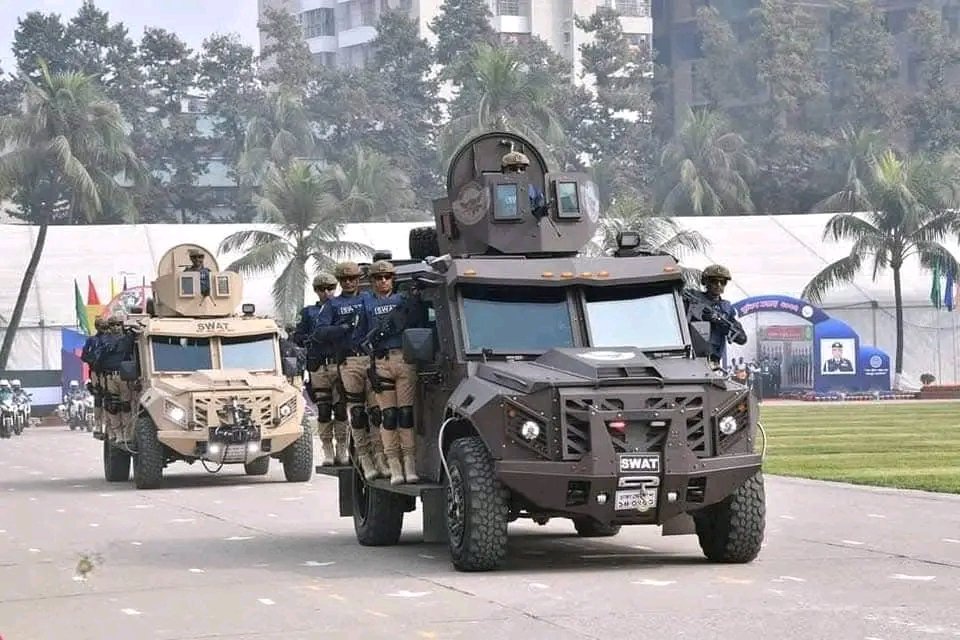The US Embassy in Dhaka’s Baridhara diplomatic enclave was placed on high alert last week following a “credible and specific” warning of an imminent terrorist attack, prompting the deployment of Bangladesh’s elite SWAT teams. The alert has cast a spotlight on a troubling rise in Islamist militancy, which critics argue has been exacerbated by the interim government’s release of convicted extremists, threatening the country’s fragile stability.
The warning, detailed in an op-ed by Subir Bhaumik for Eurasia Review, points to three suspects allegedly linked to a local cell of Al-Qaeda in the Indian Subcontinent (AQIS), a group that views Western interests as prime targets.

Bhaumik, a veteran journalist and former BBC and Reuters correspondent known for his expertise on South Asian conflicts, cites intelligence sources indicating the suspects’ ties to AQIS, though Bangladeshi authorities remain tight-lipped about their identities. The incident underscores vulnerabilities in Dhaka, where the US Embassy has long been a focal point for jihadist threats, as confirmed by a senior police official who noted the receipt of “photos and details of potential actors.”
Smuggled and looted arms, impunity for jihadists deepen security crisis
Yunus to hand over Chittagong Port to US-linked DP World in December
USS Fitzgerald in Bangladesh: Goodwill or geopolitical gambit?
The interim government, led by Nobel laureate Muhammad Yunus since August 2024, has faced mounting criticism for its handling of security. After mass protests ousted former Prime Minister Sheikh Hasina, Yunus lifted a ban on the Islamist Jamaat-e-Islami party and freed dozens of convicted terrorists, including Syed Mohammad Ziaul Haque, alias “Major Zia.”
Haque, a sacked army officer, was sentenced to death in absentia for the 2015 murder of US citizen and secular blogger Avijit Roy, a crime tied to his role in the Al-Qaeda-linked Ansar al-Islam. The US State Department had offered a $5 million bounty for his capture in 2021. Now residing openly in a military officers’ housing society in Dhaka’s affluent Banani area, Haque is reportedly meeting with retired officers to build an “Islamic Revolutionary Force” akin to Iran’s militias.

Yunus’s administration defends these releases as efforts to correct “politically motivated” detentions under Hasina, who was accused of weaponising anti-terror laws. Among those freed is Jasimuddin Rahmani, leader of the Ansarullah Bangla Team, alongside over 140 others, by late 2024.
Rahmani, other jihadist patrons want all ‘Islamic scholars’ freed from jail
Anarchist YouTuber Elias Hossain using US soil to promote al-Qaeda jihadist
Yet, these moves have coincided with a surge in mob violence, including the vandalism of a sculpture honouring police killed in the 2016 Holey Artisan Bakery attack, an ISIS-claimed assault that left 29 dead. Critics, including Bhaumik, warn that such actions signal a dangerous emboldening of extremists.
The US Embassy threat follows the mysterious death of Terrence Arvelle Jackson, a US Army Special Forces officer, found dead in Dhaka’s Westin Hotel on August 31. Authorities attributed the 50-year-old’s death to natural causes, but the lack of an autopsy and his presence on a “government-related” trip have sparked speculation of foul play amid rising jihadist activity. Indian intelligence, wary of regional spillover, has intensified border monitoring.
Human rights groups, including Human Rights Watch, have condemned the interim government’s selective justice, noting mass arrests of Awami League activists while radicals target minorities and secular events. Bhaumik argues in *Eurasia Review* that a cabal of ex-soldiers, including Haque and reinstated officers like Brigadier Abdullahil Azmi and Major General Rezzakul Haider Chowdhury, is collaborating with Jamaat-e-Islami to “cleanse” the military of secular elements ahead of the 2026 elections. Chowdhury’s recent trip to China, reportedly to explore arms sources, has raised further alarms.
Sheikh Hasina: Islam is not safe in the hands of Yunus-Jamaat clique
Sheikh Hasina vows to bring Yunus, BNP, Jamaat, militants to justice
The US State Department’s “reconsider travel” advisory underscores ongoing terrorism risks, while embassy spokesperson Asha Beh declined to elaborate beyond confirming cooperation with local authorities. As Islamist rallies, including Hizb ut-Tahrir’s calls for a caliphate, gain traction, Yunus’s claim of restoring institutional confidence—made in a September NPR interview—rings hollow. Backed by students and a tentative military, his government faces accusations of foreign meddling, with some alleging Western support for Hasina’s ouster.
Echoing the concerns of the people and human rights groups, the Government of Canada has issued a travel advisory for its citizens due to the rapidly deteriorating law-and-order situation and the growing threat of extremism and terrorism in Bangladesh.
According to the official notice issued on September 19, the security situation could deteriorate with little warning due to possible demonstrations, clashes, and nationwide general strikes.
The women travelling alone may face some forms of harassment and verbal abuse. So, they should avoid travelling alone, including on public transportation, especially at night and should not go to the police station without an accompaniment.
Security analysts warn that if the current situation remains unchecked, Bangladesh may soon face even stricter travel restrictions from Western nations, further reinforcing its image as a country at risk of being defined as a “terror-prone state.”
Canada has also imposed a complete travel ban on the three hill districts—Rangamati, Khagrachhari, and Bandarban—due to politically motivated violence, kidnappings and sporadic ethnic clashes.
“Violent clashes occur between indigenous communities that are organised under opposing political groups. The clashes result from their desire to obtain political control over specific geographic areas. These groups also engage in extortion and drug, money and weapons smuggling.
“If you decide to visit the Chittagong Hill Tracts region despite this advisory, you must contact the Chittagong Divisional Commissioner’s Office at least 10 days before you arrive.”
The statement asked travellers to exercise a high degree of caution because of ongoing political unrest, violent demonstrations, sexual harassment, kidnappings, organised robberies, and rising attacks on religious minorities.
Asking Canadian citizens to avoid all demonstrations and gatherings, the advisory added that sudden, potentially violent demonstrations and clashes can take place any day. Larger crowds usually gather on Friday afternoons following Jumma prayers. Previous violent protests have resulted in thousands of casualties.
“Certain groups have used explosive devices and firearms during confrontations between rival political factions, demonstrators and police,” it said.
The US Embassy Threat: A jihadist resurgence?
The October 14 alert exposed a plot by a three-member AQIS/Jama’atul Ansar Fil Hindal Sharqia (JAHS) cell to strike the US Embassy, aiming for a “sensational” coup trigger. Major Zia, a dismissed army officer and death-row convict for the murders of US-Bangladeshi author Avijit Roy and publisher Faisal Arefin Dipan, is the alleged mastermind.
His group, Ansar Al Islam, has capitalised on Yunus’s leniency: over 300 jihadists, including cleric Jasimuddin Rahmani, were freed post-August 2024, allegedly for uprising support. Syed Zia, once a $5 million US bounty target, returned from ISI-sheltered Pakistan in December 2024, using a Pakistani passport to petition for case dismissals via Channel-24 and social media.
Ensconced in Banani DOHS and the Disappearances Commission—led by his uncle Mainul Islam Chowdhury—Syed Zia allies with ex-officers (Brig Gen Abdullahil Amaan Azmi, Colonel Hasin, Brigadier Hassan Nasir) and ISI-backed generals (Kamrul Hassan, Faizur) to purge 150 secular officers, aiming for an Iran-style “Islamic Resistance Army.”
ISI consultants, embedded since August 2025, advise on army Islamization, per Organiser. Ansar Al Islam’s recruitment thrives on 100-150 Telegram channels, targeting Rohingya and youth amid economic collapse (2.3% GDP, 12% inflation). Syed Zia’s August 2025 posts urged Manipur/Khalistan/Kashmir bases in Dhaka, evading a Tk20 lakh bounty, amplifying anti-India militancy. The embassy plot, timed with ICT warrants against 24 officers, aimed to exploit army unrest for a coup, per Blitz.
US Military Presence in Bangladesh: Cooperation or Covert Control?
The US-Bangladesh military ties deepened post-August, with Tiger Lightning (100 Para Commandos, 66 Nevada Guardsmen for counter-terror) in July and September’s Pacific Angel 25-3 (92 US/150 Bangladesh airmen for SAR in Chattogram).
The RQ-21 drones and patrol boats bolster maritime security, but 120 unlisted personnel arrivals spark secrecy fears. The August 31 death of Special Forces officer Terrence Arvelle Jackson at Westin Dhaka—sans autopsy, with maps/devices suggesting Rohingya/militant ops—fuels espionage rumours.
Yunus’ concessions—Chittagong Port via Quad’s “Ports for Future,” and the 99-year lease of Saint Martin’s—evoke Sheikh Hasina’s rejections of a “Christian state” plot, alarming India/China.